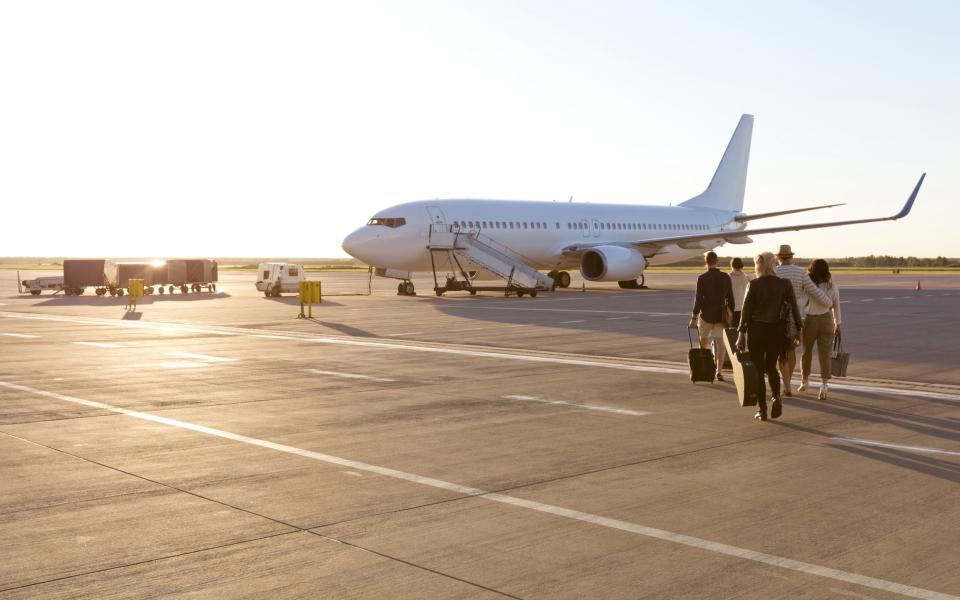Flying will become “something for the rich and privileged” as airlines face significant tax rises on jet fuel, according to a Jet2 boss, with some destinations set to be more expensive than others.
Speaking at the Jet2holidays conference in Turkey this week, Jet2 chief executive Steve Heapy said the aviation sector produces less carbon dioxide than other industries, including meat production, but airlines have to pay more in taxes carbon.
For many years, tax exemption on jet fuel enabled airlines operating in the UK and EU to keep prices artificially low. Now, aviation is facing a growing list of environmental tolls as governments work towards net-zero 2050 goals.
So what exactly is going to change, and which destinations will be more expensive?
Carbon permits and a “huge” tax hike.
Under the United Kingdom’s emissions trading scheme (ETS), the cost of a license per tonne of carbon dioxide has risen by a factor of almost 16 in just five years. Heapy said Jet2 emits about 2.2 million tonnes of CO2 per year. In 2018, the license cost £5 a tonne. Today, that has risen to £78 a tonne, he said.
The aviation industry may have been subject to tax waivers on jet fuel until now, but this could be about to change: Heapy warned that the introduction of a tax could mean higher ticket prices for the consumer EU-wide “huge” on jet fuel. .
“Imagine your tax rate went up to 70 per cent – that’s what will happen with jet fuel,” he warned this week.


The rise in flight tickets is already happening and there are many factors at play, including renewed demand for travel after the pandemic, airlines recovering lost earnings, an increase in air passenger duty (APD), and spike in the cost of oil after Russia. the invasion of Ukraine and, more recently, the war in the Middle East.
Change is already underway. Earlier this year, easyJet revealed that its average fares (from January to March, 2023) were up 31 per cent year on year. Johan Lundgren, chief executive of the low-cost airline, said the increase was the result of significant increases in costs, particularly in the price of jet fuel. Ryanair fares increased by 20 percent in 2022, with a further 15 percent jump in 2023.
Ryanair to narrow down Portugal routes
Heapy’s words come just days after Ryanair said it would be reducing its services from the UK to some destinations in Portugal, due to increased airport charges.
“We are the latest victims of the ANA/Vinci monopoly, which has raised airport charges dramatically for next year,” said Ryanair chief executive Michael O’Leary. ANA Aeroportos de Portugal manages 10 airports in Portugal.
Ryanair closed its base in Ponta Delgada in the Azores this winter for this reason, and warned that further reductions in services to Portugal could be on the horizon.
“If ANA continues with these latest monopoly price increases until 2024, Ryanair plans to significantly reduce one of its Madeira-based aircraft and significantly reduce our schedules to and from Faro and Porto for the summer of 2024, ” said O’Leary.


Portugal is set to increase its airport charges by an average of 14.6 per cent in 2024, which equates to around €1.60 (£1.38) per passenger, per flight. This, O’Leary said, would “damage Portugal’s competitiveness” and “put out much-needed tourism growth”.
Madeira could have a double win. As it is in the non-EU regions, it has always been exempt from the EU Emissions Trading Scheme charge. However, this exemption is due to be removed by 1 January 2024 (when flying in from other EU member states), and is likely to result in higher ticket prices. This change will also affect the Canary Islands. Heapy predicts this could add £25 to the cost of flying to these destinations.
The start of “green fuel”
The introduction of Sustainable Aviation Fuel (SAF) could increase the cost of flying. The topic was in the news this week, when Virgin made its first transatlantic flight using the alternative jet fuel.
Willie Walsh, IATA Director General and former chief executive of British Airways, said: “It will mean higher fares, as sustainable aviation fuel is more expensive than your traditional jet kerosene. As we transition to net zero, it will cost some money.”


There are further concerns about the scalability of SAF, with suggestions that it could never be implemented on more than a limited number of flights.
The increase in airline ticket prices will affect not only the pocket of the tourists, but the destination itself. A Deloitte report in 2022 entitled “Flying Towards a sustainable future” predicted that Spain could lose up to 11 million international tourists per year due to the series of aviation tax measures that are emerging.
There are certain destinations that already cost more to reach.
Based on the average ticket price between 2017 and 2022, the cost of flying from the UK to Istanbul has increased by 69.4 per cent, according to OAG data. Other cities that saw significant increases include Amsterdam (31.1 percent), Rome (33.3 percent) and Santander (60.9 percent).
The total cost of the package holiday is also increasing. A Which one? a comparison of average prices for package holidays in six popular destinations showed that a week’s break in 2023 increased by an average of 30 per cent year-on-year – to £867 per person. A seven-night trip to Italy cost an average of £616.68 per person last year. This year, the same journey would cost £757.53 – a 23 per cent increase.